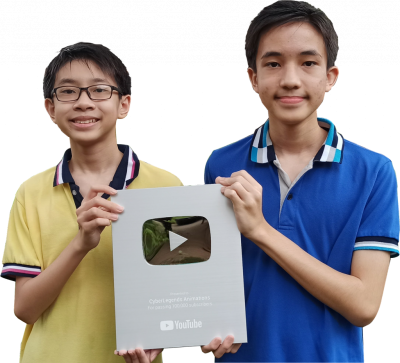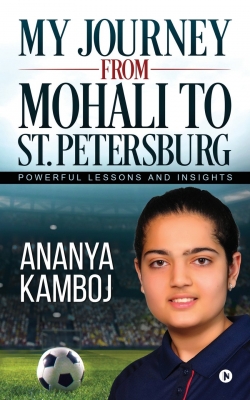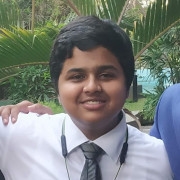AN INTERVIEW OF YOUNG ACHIEVERS SHELDON CHONG AND EMERSON CHONG (AUTHORS, DIGITAL ARTISTS, MUSICIANS, ANIMATORS, YOUTUBERS, CODERS, GAME DEVELOPERS, WORKSHOP FACILITATORS, ENTREPRENEURS)

Sheldon Chong (15) and Emerson Chong (13) are award-winning siblings from Malaysia. They are authors, digital artists, musicians, animators, YouTubers, coders, game developers, workshop facilitators, entrepreneurs, and changemakers. They recently received the Silver YouTube Creator Award for reaching 100K subscribers, which they achieved within 10 months! They speak about their journey .
How did CyberLegends Animations come about?
Emerson: CyberLegends Animations is a YouTube channel 1 started. During the lockdown in 2020, 1 actively started creating and posting 2D animations on the channel. It all began when discovered a free animation app. Sheldon and I thought animation could be the next step in our art journey. Through the app. I learnt the tricks and a few tips to animate efficiently. When CyberLegends Animations started to grow, I started to animate based on popular games, giving them my own twist. Because we needed to produce animations quickly, consistently, and with high quality, Sheldon and I started to work together because he is skilled in digital art and can produce high quality work fast.
What are the awards you have won? Do you think that winning awards contributes to success?
Sheldon: We have won many awards locally and internationally. One of the competitions we participated in was the Young Entrepreneurs X-Factor in 2019. We had to pitch to the judges our solution to a problem. My idea was an Internet of Things-based smart parking system with an app that solves the problem of finding parking spaces. It uses cloud technology and Bluetooth to show data of parking spaces in real-time. Emerson's project was to gamify learning history, and he pitched the idea of a pixelated roleplay game that showcases Japan's history and culture. Emerson won the first place, and I was the runner-up in our respective age categories, winning scholarships to an international school. Recently, we took part in the Young Educators Challenge, in which we won the first place, which was a college scholarship. The objective was to teach a lesson online in a very engaging and innovative way. We combined roleplay and games to teach students in a fun way. We think awards are a result of success, through putting effort into your passion. Even if you don't win but learn something, that would still be a success.
Tell us about your journey in writing.
Emerson: We have written two children's story books each. "The Time Dimension" and "The Elementals" by Sheldon and "Attack of the Evil Clone" and "Egypto's Adventure" by me. These are fictional stories for kids and teens. We got into writing by reading comics and other books, and eventually, we were interested in writing stories and combining them with our illustrations to create books.
Tell us about your comic Earth Boy and the documentary about it.
Emerson: This started when I took part in the international UNICEF Climate Comic Contest, in which participants had to create their own eco superhero. I created a character called Earth Boy, and then I explained. his powers and backstory. As a e runner-up amongst 3,000 entries, my character got its own comic and was translated into Spanish, French, and Hindi. I collaborated with an artist in New York who helped me create this comic it was published by the UNICEF in New York in 2018. After the comic was released, I kind of used Earth Boy as a mascot. I drew more Earth Boy comics such as 'Earth Boy & Friends doing Beach Cleanup', and 'Earth Boy & Friends at the Mall, and shared them on social media. After hearing about my work, the United Nations sent a producer from the U.S. to film a short video about it. The video was about my work to inspire others to help save the Earth, using my creativity and art skills.
You are into music. What kind of music do you play?
Sheldon: I play the piano, and Emerson plays the guitar and sings. With just the two of us, we started a small band. We perform mostly pop songs at functions, open mics, and charity events. Our parents encouraged us to play music, and eventually, playing live to the public helped boost our confidence to do even more.
What message do you have for your peers?
We think it is important to find and follow your passion. Through your passion, you can find ways to do so many other things. All the things that we have done, i.e. music, animation, writing, etc. came from our passion, drawing. Even if you don't have a passion, you can always learn something from books, a friend, the Internet, and more. Passion adds value to you and what you do.
As siblings, how does it feel to have somebody by your side who can help you?
Emerson: Well, we have our parents, who give us a lot of support in what we do. Drawing has been our passion since we were really young. and our parents supported us. They also took us to art galleries and museums to help us enrich our knowledge about art. They are never against what we do, and support our passion. We also are very supportive of each other. For example, Sheldon helps me with my animation through colouring digitally and making the thumbnails, while I animate and add sounds. Sometimes we do have our own views on how we want to do things, but there's always something where we work together.
What do you like to do in your free time, apart from your work in writing, animation, and art?
Emerson: I like creating art and crafts with paper and cardboard. Once I made my own card game and took it to school, and surprisingly, a lot of people played it! Sheldon likes sports, especially swimming, cycling, and kayaking.
What are your plans for the future? What is one thing you want to change in society?
Sheldon: We are probably going to write more books, and I want to learn to compose music, and Emerson wants to grow our YouTube channel to reach one million subscribers. We would like to change the mindset of people, to inspire them to follow their passion and to unfold their potential.
Picture Credit : Google

